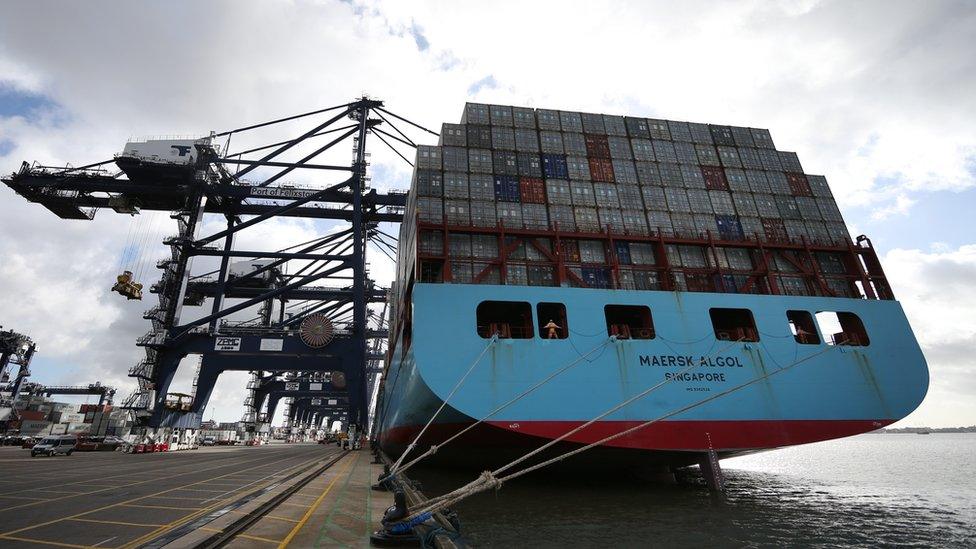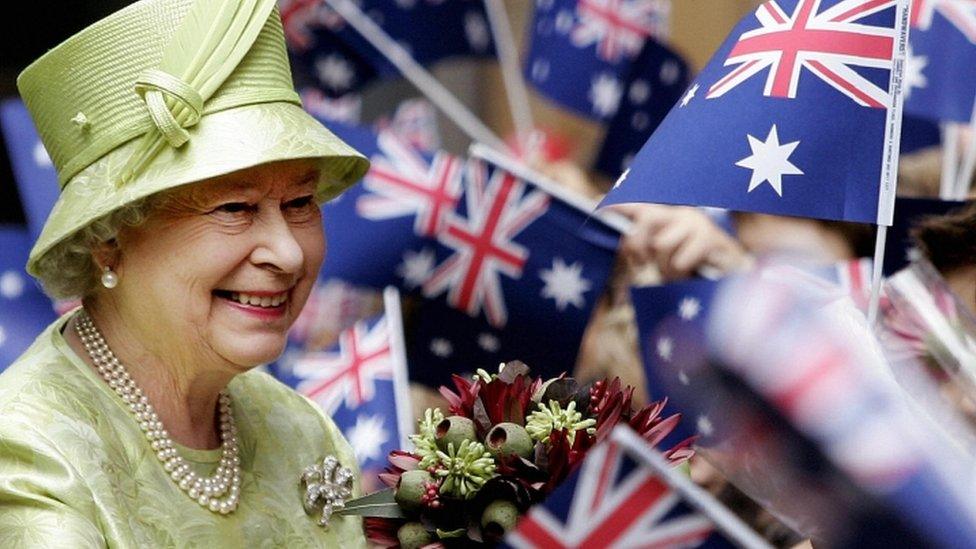Can the Commonwealth be good for post-Brexit Britain?
- Published
- comments

China understands the value of the Commonwealth. Between 2006 and 2016, the country's total trade with the historic organisation of 53 nations grew by 8.4 times and is now valued at nearly £200bn. That's an awful lot of power plants, motorways, food, steel and solar panels.
This week leaders of the Commonwealth, which accounts for a third of the world's population (and 40% of people under the age of 30), gather in London for the latest Heads of Government summit.
Alongside protecting the oceans and international development support, trade and investment will be high on the agenda.
Prime Minister Theresa May is scheduled to speak at the opening business forum on Monday, and will make much of the commercial opportunities available to the Commonwealth club.
With Britain officially scheduled to leave the European Union next year, one question has regularly cropped up in the Brexit debate.
If the UK needs to play a greater role on the world stage, isn't the Commonwealth a ready-made springboard - a grouping of countries with broadly the same legal structures and democratic outlooks that are ideal partners for a post-EU Britain?
Shouldn't the UK be seeking out some of the success China has so clearly had? The simple answer is yes.
Trade with "the Commonwealth" - and particularly its substantial African and Asian members such as Nigeria and India - has often fallen short of expectations, given the historic ties between Britain and the rest of the organisation.
Baroness Scotland says Britain is an "incredibly important" member of the Commonwealth
But whatever successes may be ahead, it is important to keep the potential in perspective. After all, Commonwealth nations take just 9% of UK exports of goods and services, while the EU takes 43%.
The organisation is also not a formal trading alliance with the same powers as or global heft of the EU.
Critics of those that argue the Commonwealth may be able to replace any lost trade with the EU point out that being a member of both is not mutually incompatible.
Indeed, many Commonwealth countries such as India backed the UK remaining in the EU, seeing it as good for Indian businesses that use Britain as a base for European operations.
According to a recent report by the Bruegel think tank, external, trade between countries such as India and the 27 nations of the remaining EU has tripled since 2000. At the same time, UK-India trade has stayed "largely static", revealing that the "Commonwealth effect" is often over-played.
'Incredibly important'
The Commonwealth leadership itself is also careful to keep its distance from the Brexit debate.
I asked the Secretary General, Baroness Patricia Scotland, whether leaving the EU might be good for UK-Commonwealth trade as Britain would be freer to sign new free trade deals with members.
Indeed, Canada, the second most valuable Commonwealth member to the UK in terms of trade (Australia is first), has already signalled that any new free trade deal with Britain could have more impact than the Canada-EU agreement.
"I think Britain is an incredibly important member of the Commonwealth," she said. "And whether Britain decided to say within or without the EU, that relationship with the Commonwealth was always going to be there.
"Now there's a strong argument to say that no longer being part of the EU could give the UK - if it chose - greater liberality in the way in which it did deals. But you'll know that there are many advantages and disadvantages [of Brexit]."

Baroness Scotland added: "The good thing is, whether the UK was within the EU or without the EU, the Commonwealth [trade] advantage would and is still there, and I'm delighted that the spotlight now is on the advantage."
The Commonwealth secretariat claims that intra-Commonwealth trade could increase to $1trn (£700bn) by 2020 - well above the $560bn recorded in 2016.
New trade finance facilities to be agreed at this week's summit in London and new free trade agreements between a selection of Commonwealth nations (such as the African Continental Free Trade Area) should help.
And the more free trade there is within the Commonwealth - which is instinctively non-protectionist - the more the UK can gain.
Britain is the leading source of "greenfield investment" funding within the organisation, for example. "I think that's really exciting when you think about what a troubled and troubling time we live in," Baroness Scotland said about intra-Commonwealth trade growth.
"And the fact that all these countries speak the same language, have the same political opportunities in terms of democracy and institutions and share the same common law, it's a real platform to go forward. And I don't think the world has needed the Commonwealth more than it needs it now."
That is possibly especially true for post-Brexit Britain.
- Published15 April 2018

